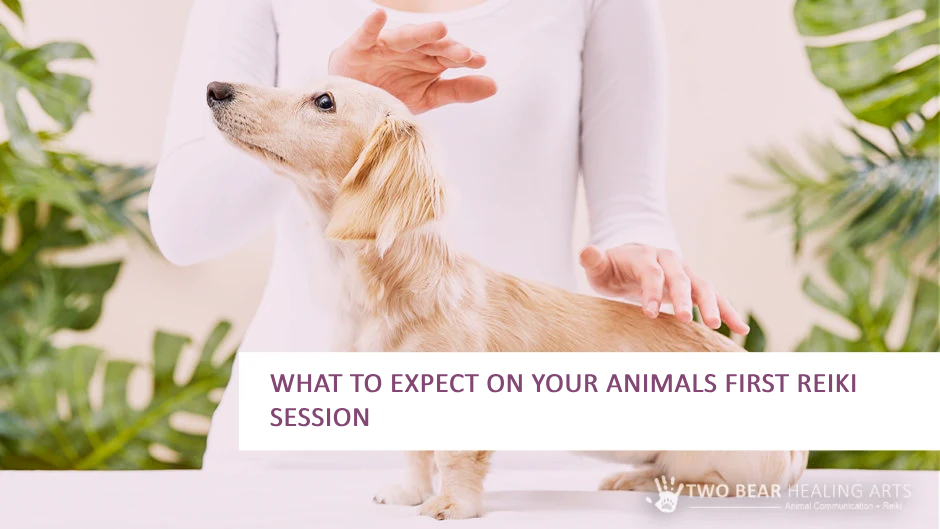Reiki is an ancient Japanese healing modality that aims to restore balance in the body and promote healing. It involves the transfer of universal life force energy from the practitioner to the recipient through their hands. This energy promotes relaxation, reduces stress and anxiety, boosts the immune system, and alleviates physical, emotional, and mental ailments. Reiki can benefit both animals and their humans and is used to complement traditional veterinary care. If you’re considering scheduling your animal’s first Reiki session, you can expect a calming and peaceful experience that can help improve their overall well-being.
Preparing for the Session
Before your animal companion’s Reiki session, keep these tips in mind to help them feel more relaxed and at ease during their Reiki session.
-
- Create a calm atmosphere
- Find a quiet and comfortable space where your animal won’t be disturbed
- Ensure your animal can access water, food, and treats for comfort
- Ensure your animal can move freely by providing a comfortable and safe space to stretch, stand up, and lie down as they please
- If your animal is receiving distance Reiki, remove distractions such as loud noises, other animals, or visitors
With these simple steps, you can create a peaceful environment that is conducive to their healing process.
During the Session
The session length for your animal will depend on their needs and preferences and can range from 15 minutes to an hour. The practitioner will begin by introducing themselves to your animal family member and asking their permission to proceed. They will then gently place their hands on or near your animal’s body, following their intuition and guidance from the Reiki energy. The practitioner may focus on specific areas where your animal companion needs healing, such as their chakras, organs, or joints. They may also move their hands around your animal’s body in a smooth and flowing motion to balance and harmonize their energy field.
During the session with your animal companion, you may notice different reactions from them. They may show signs of relaxation, such as yawning, stretching, closing their eyes, or falling asleep. Alternatively, your animal may show curiosity or interest towards the practitioner’s hands, such as sniffing, licking, or nudging. However, they may also move away or indicate their desire to stop; all of these reactions are normal and acceptable. Your animal companion knows best what they need, and the practitioner will respect their wishes and adjust accordingly.
After the Session
Upon completing the session, the practitioner will express their appreciation to your animal family member for their cooperation and provide you with helpful insights on what they sensed or noticed during the session. Additionally, they will offer practical suggestions on supporting your animal companion’s healing process at home, such as ensuring they have enough water, rest, or exercise. Observing your animal’s behavior and mood after each session and noting any positive changes or improvements is recommended. This can help you track their healing progress and ensure they receive the best care possible.
Reiki can have an immediate or delayed effect on your animal companion, depending on their response and condition. After a session, some animals may feel more energetic, happy, or playful, while others may feel tired, sleepy, or quiet. It is important to note that a temporary worsening of symptoms, known as a healing crisis, is a normal reaction and indicates Reiki is working to release stuck energy, toxins, and negative emotions. Reiki can be a beneficial and effective way to improve your companion animal’s well-being.
To provide your animal companion with the best possible care, it’s important to remember that Reiki is not a substitute for veterinary care but rather an additional form of support. By working in conjunction with your veterinarian, Reiki, and veterinary care can be used to enhance your animal’s well-being. It’s highly recommended that you inform your veterinarian that you will be incorporating Reiki energy into your animal’s healthcare program. If you notice any positive changes in your animal’s health or behavior after a Reiki session, keeping your vet informed is always a good idea. By using Reiki in conjunction with veterinary care, you can help your animal achieve optimal health and well-being and bring this wonderful healing art to your animal’s healthcare team.
A guide through this healing journey
Reiki is an incredible healing technique that has been shown to have numerous benefits for the overall health and well-being of animals. It can help reduce stress and anxiety levels, promote relaxation, and speed up healing. Consider including Animal Reiki sessions in your animals wellness routine to provide them with the best possible care. It will help your animals lead healthier and happier lives.
Take action now:
Stress Relief: Reiki is a powerful stress reliever, promoting relaxation and peace, and animals respond beautifully.
Single Session: If your animal is going through a specific situation, such as recovering from surgery, adjusting to a move, or giving birth, you can book a single Animal Reiki session.
Plan a Series of Sessions: For complex health, emotional, or behavioral issues, a series of Animal Reiki sessions, whether in-person at your home, barn, stable, or remotely, can be the key to transformative results.
Susan J. Squittieri is a Reiki Master and Professional Animal Communicator who has nearly two decades of experience in deepening the emotional, mental, and spiritual connection between humans and animals through the healing art of Reiki and animal communication.
If you have any questions or concerns regarding your animals and want to experience the transformative power of Reiki, contact Susan today to schedule your Animal Reiki session. She is dedicated to providing optimal health and well-being for your entire human and animal family.


0 Comments